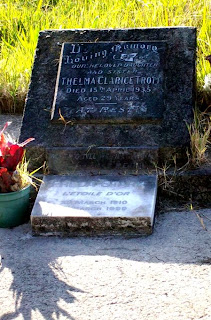I went on a walk around the Waikumete Cemetery put on by the Friends of Waikumete last Saturday. I was asked by one of them why I was taking a lot of photographs (and answered, of course, that I was collecting stuff for a blog). One of the grave sites visited was that of Thelma Mareo, née Trott. You wouldn't know that by the gravestone, probably paid for by her mother after Thelma died of an overdose of veronal (and possibly also alcohol) in 1935.
Veronal in those days was one of the early barbiturates, a "sleeping draught" as such medications were once termed. Around since the turn of the century, by 1935 the NZ Government recognised the danger of a depressant which could easily and lethally be misused, and so made it prescription-only, two weeks prior to Thelma Mareo's death. Her husband Eric, an out-of-work musician and composer who had worked at the St James Theatre, was using veronal, and stockpiled when it looked like casual supplies of the drug would be limited. Not a good move when your wife was a depressive.
She died from overdose, he went to trial (twice), was sentenced to death, later commuted, served 12 years, with more years beyond that on probation, and was finally clear of the legal system just before he died. The member of Friends of Waikumete who described the case last Saturday at the graveside said firmly that it couldn't have been suicide, that it had to be murder. (No one commits suicide with poison, I believe was whaat was said. I refuted that, by reminding those there of "Rough on Rats", a common method of suicide in the early years of last century. Further reading revealed that veronal, also, had been used in at least attempts at suicide before the Mareo case.) Eric Mareo's name wasn't even mentioned.
But a third option, on reading the online copy of the book The Trials of Eric Mareo (well worth a read) comes to mind. Thelma was a mother's girl, a depressive, "highly-strung" in the old parlance. Deeply fearful of ever being pregnant, she had a marriage of convenience with Mareo, more than anything else. Her love affair with Freda Stark was never truly outed during Mareo's trial -- to have done so, in the Crown's case, would have portrayed her as a sexual pervert in those times. Thelma drank, exhibited signs of depression, and perhaps took just a bit too much of both alcohol and the veronal in the days leading up to her death. Death by accidental overdose would be the third option, here.
When Freda Stark died, she was buried with Thelma, and her "L'Etoile D'or" plaque is on the grave site. The case that they are associated with, however, continues to fascinate.



















































